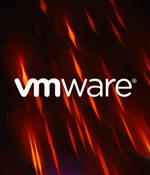Security News

VMware on Monday said it found no evidence that threat actors are leveraging an unknown security flaw, i.e., a zero-day, in its software as part of an ongoing ransomware attack spree worldwide. The company is further recommending users to upgrade to the latest available supported releases of vSphere components to mitigate known issues and disable the OpenSLP service in ESXi.

We and our store and/or access information on a device, such as cookies and process personal data, such as unique identifiers and standard information sent by a device for personalised ads and content, ad and content measurement, and audience insights, as well as to develop and improve products. With your permission we and our partners may use precise geolocation data and identification through device scanning.

Late last week, unknown attackers launched a widespread ransomware attack hitting VMware ESXi hypervisors via CVE-2021-21974, an easily exploitable vulnerability that allows them to run exploit code remotely, without prior authentication. Patches for CVE-2021-21974, a vulnerability in ESXi's OpenSLP service, have been provided by VMware two years ago, and this attack has revealed just how many servers are out there are still unpatched, with the SLP service still running and the OpenSLP port still exposed.

France's Computer Emergency Response Team has issued a Bulletin D'Alerte regarding a campaign to infect VMware's ESXI hypervisor with ransomware. Targets don't come much richer than ESXi - the bare metal hypervisor can afford access to many guest machines that run apps and store data.

Royal Ransomware is the latest ransomware operation to add support for encrypting Linux devices to its most recent malware variants, specifically targeting VMware ESXi virtual machines. The new Linux Royal Ransomware variant was discovered by Will Thomas of the Equinix Threat Analysis Center, and is executed using the command line.

VMware ESXi hypervisors are the target of a new wave of attacks designed to deploy ransomware on compromised systems. "A malicious actor residing within the same network segment as ESXi who has access to port 427 may be able to trigger the heap-overflow issue in OpenSLP service resulting in remote code execution," the virtualization services provider noted.

Admins, hosting providers, and the French Computer Emergency Response Team warn that attackers actively target VMware ESXi servers unpatched against a two-year-old remote code execution vulnerability to deploy ransomware. "As current investigations, these attack campaigns appear to be exploiting the vulnerability CVE-2021-21974, for which a patch has been available since 23 February 2021," CERT-FR said.

A relatively new ransomware operation known as Nevada seems to grow its capabilities quickly as security researchers noticed improved functionality for the locker targeting Windows and VMware ESXi systems. Nevada ransomware features a Rust-based locker, real-time negotiation chat portal, separate domains in the Tor network for affiliates and victims.

Horizon3 security researchers have released proof-of-concept code for a VMware vRealize Log Insight vulnerability chain that allows attackers to gain remote code execution on unpatched appliances. Earlier today, Horizon3 published the PoC exploit and explained that the RCE exploit "Abuses the various Thrift RPC endpoints to achieve an arbitrary file write."

Security researchers with Horizon3's Attack Team will release an exploit targeting a vulnerability chain next week for gaining remote code execution on unpatched VMware vRealize Log Insight appliances. Now known as VMware Aria Operations for Logs, vRealize Log Insight makes it easier for VMware admins to analyze and manage terabytes of infrastructure and application logs.